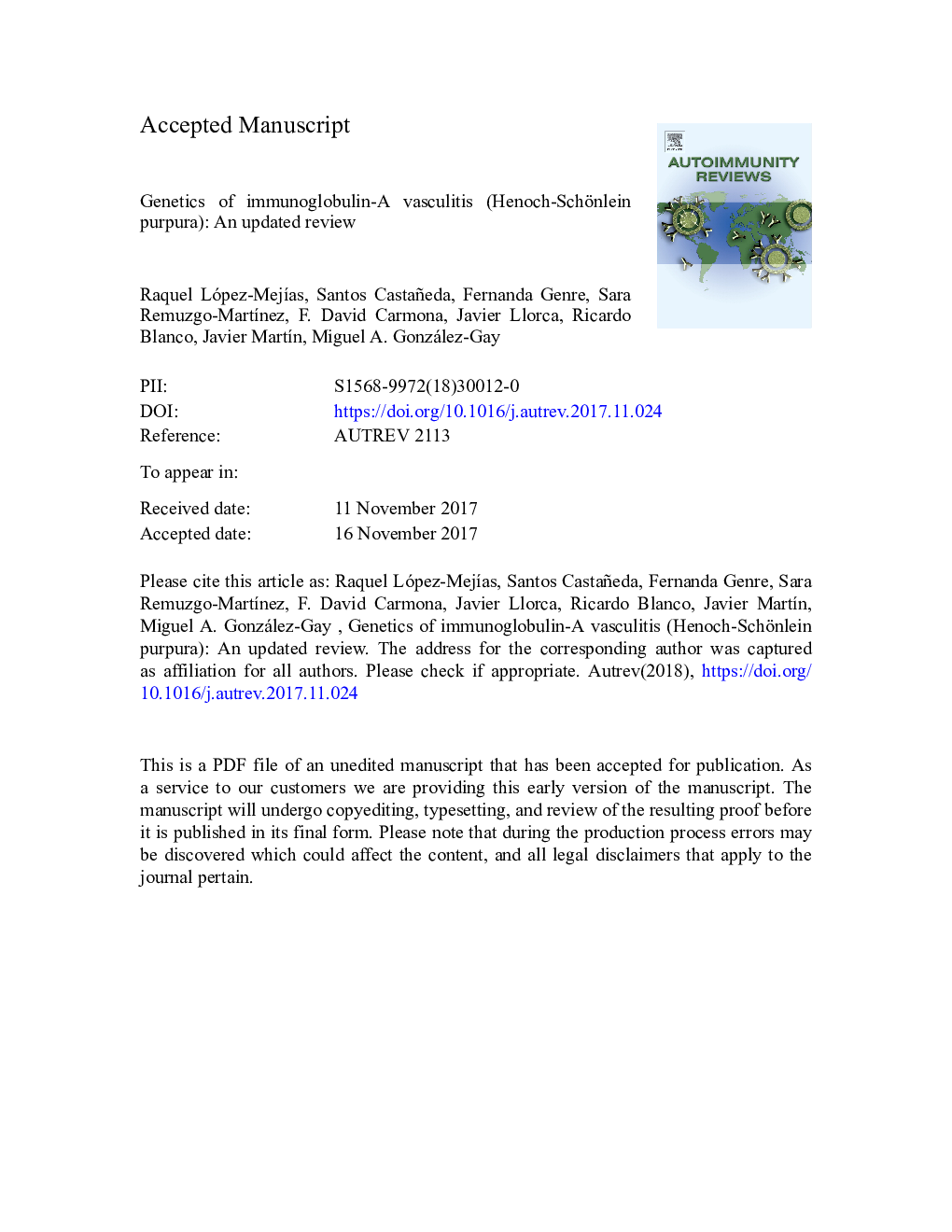| Article ID | Journal | Published Year | Pages | File Type |
|---|---|---|---|---|
| 8736458 | Autoimmunity Reviews | 2018 | 76 Pages |
Abstract
Immunoglobulin-A vasculitis (IgAV) is classically a childhood small-sized blood vessel vasculitis with predominant involvement of the skin. Gastrointestinal and joint manifestations are common in patients diagnosed with this condition. Nephritis, which is more severe in adults, constitutes the most feared complication of this vasculitis. The molecular bases underlying the origin of IgAV have not been completely elucidated. Nevertheless, several pieces of evidence support the claim that genes play a crucial role in the pathogenesis of this disease. The human leukocyte antigen (HLA) region is, until now, the main genetic factor associated with IgAV pathogenesis. Besides a strong association with HLA class II alleles, specifically HLA-DRB1 alleles, HLA class I alleles also seem to influence on the predisposition of this disease. Other gene polymorphisms located outside the HLA region, including those coding cytokines, chemokines, adhesion molecules as well as those related to T-cells, aberrant glycosylation of IgA1, nitric oxide production, neoangiogenesis, renin-angiotensin system and lipid, Pyrin and homocysteine metabolism, may be implicated not only in the predisposition to IgAV but also in its severity. An update of the current knowledge of the genetic component associated with the pathogenesis of IgAV is detailed in this review.
Keywords
ANCAIL-6CCL2IL-1HDLACEVEGFARASNOSiNOSMCP-1PTPGCAeNOSPON1IL-1βVNTRnNOSTLR2AAVTLRIL-1RAAT1RCcl5ICAM1MBLAT2RTLR4Pax2IL-6RIL-18IL-8NOS1NOS2MTHFRCXCL5TGFB1PTPN22TNFaFVLSELEregulated upon activation normal T cell expressed and secretedangiotensin II receptor type 2MASPELAM-1MEFVNOS3CSKNPHS2IgA1ENA-78C1GALT1CD152SELPNOS2AHSPA2Hsp70sImmunoglobulin A1TNFTGF-βchemokine C-C motif ligand 2CTLA-4interleukin 6 signal transducerIfngIgANT-helper 1Giant cell arteritisInterleukin 1 receptor antagonistAntineutrophil cytoplasmic antibodyHuman leukocyte antigenHLAangiotensinAngiotensin-converting enzymeUteroglobinendothelial nitric oxideneuronal nitric oxideinterferonIFNinterleukininterleukin 1interleukin 1 betaInterleukin 18interleukin 6Interleukin 8Mediterranean feverTransforming Growth Factor Betatransforming growth factor beta 1Variable number tandem repeatstumor necrosis factor alphaToll-like receptorcomplement component 4paired box 2LyPcluster of differentiationGastrointestinalrenin-angiotensininducible nitric oxide synthaseNitric oxide synthasesMIFMigration inhibitory factorFactor V LeidenVascular endothelial growth factorVascular Endothelial Growth Factor (VEGF)Vascular endothelial growth factor Atumor necrosis factorMannose binding lectinhigh density lipoproteinMethylenetetrahydrofolate reductaseRANTESGenome-wide association studiesGWASUTR یا untranslated regions untranslated regionIntercellular adhesion molecule 1endothelial leukocyte adhesion molecule-1Nitric oxide synthase 3Nitric oxidenitric oxide synthase 1nitric oxide synthase 2AGTHenoch-Schönlein purpuraParaoxonase1Protein tyrosine phosphataseGeneticsInterferon gammaangiotensin II receptor type 1Toll-like receptor 2Toll-like receptor 4
Related Topics
Life Sciences
Immunology and Microbiology
Immunology
Authors
Raquel López-MejÃas, Santos Castañeda, Fernanda Genre, Sara Remuzgo-MartÃnez, F. David Carmona, Javier Llorca, Ricardo Blanco, Javier MartÃn, Miguel A. González-Gay,
